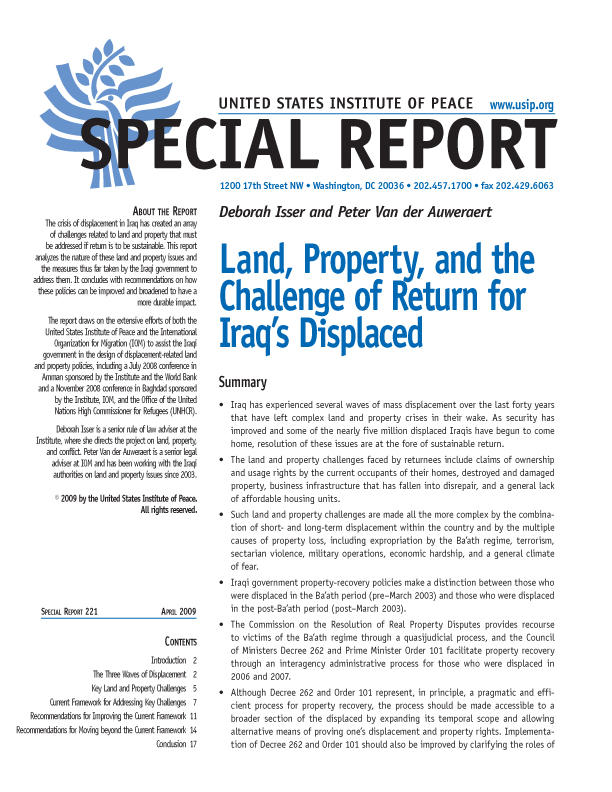Land, Property, and the Challenge of Return for Iraq’s Displaced
Iraq today is faced with a multilayered displacement crisis that is massive in both size and complexity. It is estimated that 3.8 million Iraqis were displaced from their homes from 2003 to 2008, with the majority of them becoming displaced in 2006 and the first half of 2007

Summary
- Iraq has experienced several waves of mass displacement over the last forty years that have left complex land and property crises in their wake. As security has improved and some of the nearly five million displaced Iraqis have begun to come home, resolution of these issues are at the fore of sustainable return.
- The land and property challenges faced by returnees include claims of ownership and usage rights by the current occupants of their homes, destroyed and damaged property, business infrastructure that has fallen into disrepair, and a general lack of affordable housing units.
- Such land and property challenges are made all the more complex by the combination of short- and long-term displacement within the country and by the multiple causes of property loss, including expropriation by the Ba’ath regime, terrorism, sectarian violence, military operations, economic hardship, and a general climate of fear.
- Iraqi government property-recovery policies make a distinction between those who were displaced in the Ba’ath period (pre–March 2003) and those who were displaced in the post-Ba’ath period (post–March 2003).
- The Commission on the Resolution of Real Property Disputes provides recourse to victims of the Ba’ath regime through a quasijudicial process, and the Council of Ministers Decree 262 and Prime Minister Order 101 facilitate property recovery through an interagency administrative process for those who were displaced in 2006 and 2007.
- Although Decree 262 and Order 101 represent, in principle, a pragmatic and efficient process for property recovery, the process should be made accessible to a broader section of the displaced by expanding its temporal scope and allowing alternative means of proving one’s displacement and property rights. Implementation of Decree 262 and Order 101 should also be improved by clarifying the roles of the various agencies involved in the process and by providing a dedicated capacity for administration and oversight.
- Ultimately, the Iraqi government needs to adopt a holistic strategy that goes beyond property recovery and the limited categories of displaced targeted today. It will need to grapple with the aftermath of sectarian cleansing and the fact that many displaced will choose not to go home. Its policies must also reflect the realities of the housing shortage, the humanitarian needs of returnees, the changing security conditions, and the economic crisis affecting all Iraqis.
About the Report
The crisis of displacement in Iraq has created an array of challenges related to land and property that must be addressed if return is to be sustainable. This report analyzes the nature of these land and property issues and the measures thus far taken by the Iraqi government to address them. It concludes with recommendations on how these policies can be improved and broadened to have a more durable impact.
The report draws on the extensive efforts of both the United States Institute of Peace and the International Organization for Migration (IOM) to assist the Iraqi government in the design of displacement-related land and property policies, including a July 2008 conference in Amman sponsored by the Institute and the World Bank and a November 2008 conference in Baghdad sponsored by the Institute, IOM, and the Office of the United Nations High Commissioner for Refugees (UNHCR).
Deborah Isser is a senior rule of law adviser at the Institute, where she directs the project on land, property, and conflict. Peter Van der Auweraert is a senior legal adviser at IOM and has been working with the Iraqi authorities on land and property issues since 2003.



